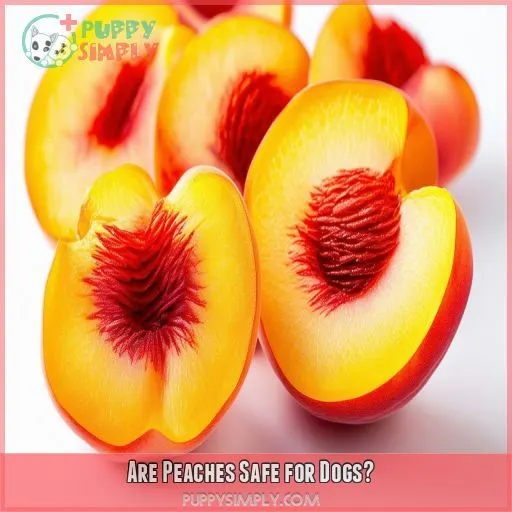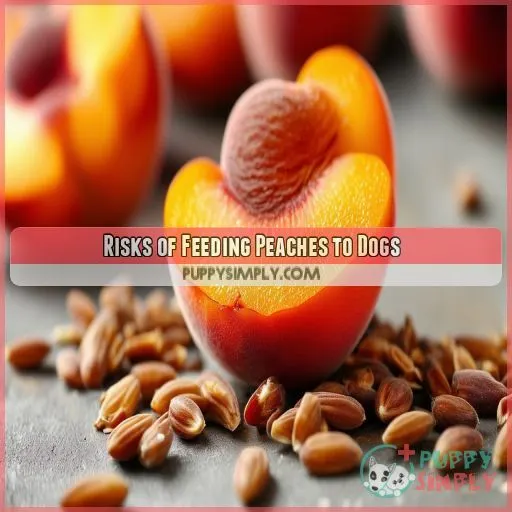This site is supported by our readers. We may earn a commission, at no cost to you, if you purchase through links.
 I was wondering if dogs can have white peaches? Look no more; the answer is yes.
I was wondering if dogs can have white peaches? Look no more; the answer is yes.
While white peach flesh does contain some great health benefits, such as dietary fiber and vitamins, preparation is necessary to avoid hazards. There are risks taken from peach pits, stems, and leaves, which could bring about blockages or choking.
Washing thoroughly, pitting, and serving in small, bite-sized pieces is essential. Introduce peaches slowly and in moderation for your dog’s safest enjoyment
Table Of Contents
- Key Takeaways
- Can Dogs Eat White Peaches?
- Are Peaches Safe for Dogs?
- Health Benefits of Peaches for Dogs
- Risks of Feeding Peaches to Dogs
- Preparing Peaches for Dogs
- Moderation is Key
- Other Fruit Options for Dogs
- Frequently Asked Questions (FAQs)
- Can dogs eat peaches with skin?
- How much peach can a dog eat?
- Can dogs eat flat peaches?
- Are peach pits poisonous to dogs?
- Can dogs eat peaches?
- Can you lose weight eating peaches?
- Can dogs eat peach skin?
- Can dogs eat peaches if they have diabetes?
- Can dogs eat peaches with the skin on?
- How many peach slices can a large dog eat?
- What symptoms indicate a dog has eaten a peach pit?
- Can diabetic dogs consume fresh peaches?
- Are frozen peaches a safe treat for dogs?
- Conclusion
Key Takeaways
- Give your furry friend a taste of summer with white peaches, but hold the pit, stems, and leaves – they’re like tiny booby traps for your pup!
- White peaches are a fiber fiesta for your dog’s tummy, helping them strut their stuff with regular bathroom breaks.
- Just like a superhero protecting your dog from bad guys, vitamins in white peaches give their immune system a boost.
- Remember, too many peaches can turn into a bellyache party, so serve them up in small portions like a wise old sage
Can Dogs Eat White Peaches?
Yes, white peaches can be fed to dogs, but with precautions attached to the same. White peaches offer benefits through dietary fiber, vitamins A and C, and immune support. Remove the pit because it represents a choking hazard or may cause blockage of the intestines.
Wash the fruit properly to remove pesticides, cut the flesh into small pieces, and feed small portions first to avoid gastrointestinal upset. Observe the reaction of your dog. Moderation is essential; otherwise, it can result in stomach upsets or obesity.
Want to learn more? We’ve got you covered with more safe practices and fruits your buddy should indulge in:
Are Peaches Safe for Dogs?
Peaches can be a pretty nice snack for your dog, but you do have to be careful. Yes, peach flesh is generally innocuous to dogs, with some benefits toward digestion. But you still need to know the dangers. The most significant threat is peach pits, which contain cyanide and can create cyanide poisoning. These are also a potential choking hazard and can cause GI upset or even intestinal blockages.
Furthermore, cyanide is contained in leaves and stems, hence another danger. Some dogs can be allergic to peaches; the fuzz on the peaches may cause some dogs light reactions. The important thing is to have moderation and proper preparation. Be sure to permanently remove the pit, stem, and leaves, and cut the peach flesh into small, easily managed pieces. Observe your dog after offering peaches for the first time to check if they don’t start with unwanted reactions. Consult with your vet about proper serving sizes and safety.
Health Benefits of Peaches for Dogs
White peaches, rich in dietary fiber, can support your dog’s digestion and improve bowel movements. Additionally, the vitamins and antioxidants found in peaches can help boost your dog’s immune system
Provide Dietary Fiber to Support Digestion
Peaches pack a punch in terms of dietary fiber to help your dog digest his food. Both insoluble and soluble fibers in peaches do the magic.
Insoluble fiber is responsible for granting your dog regularity and moving stools quickly through him. Soluble fiber feeds good bacteria needed for gut health.
Be sure to wash off the skin and remove pits to avoid intestinal blockages and choking hazards. Peaches, if prepared correctly, enhance your dog’s digestion significantly
Can Help Boost the Immune System
Peaches offer antioxidant benefits, supporting your dog’s immune system by neutralizing harmful free radicals. The nutrients in white peaches, including vitamins A and C, provide immune system support, keeping your furry friend healthy.
However, be wary of digestibility concerns; some dogs might experience diarrhea. Always introduce peaches gradually, paying attention to any allergy considerations
Risks of Feeding Peaches to Dogs
Feeding peaches to dogs can be risky due to the potential choking hazards and intestinal blockages caused by the pits. Additionally, peaches may cause gastrointestinal upset, such as diarrhea
Peach Pits Can Cause Choking and Intestinal Blockages
While peaches can provide plenty of benefits, it’s essential to be aware of the risks, especially peach pits.
Peach pits contain cyanogenic glycosides, which can poison dogs. Additionally, these pits can cause choking and intestinal blockages, making them extremely dangerous.
Always remove the pit when offering white peaches to your dog. Ensuring safe feeding by properly preparing the fruit will help prevent digestive upset and peach allergies.
Keep your furry friend’s well-being top of mind
May Cause Gastrointestinal Upset, Such as Diarrhea
Feeding peaches to your dog can result in gastrointestinal upset, which includes diarrhea from their high sugar and fiber content. Introduce the peaches in limited quantities to not trouble your dog’s stomach. Monitor for any signs of peach allergies.
- High sugar: Problems related to the stomach will occur, and diabetes can also occur.
- Fiber: While beneficial, it may lead to diarrhea if taken in excess.
- Pesticides: Always wash peaches well to rid them of harmful residues.
Preparing Peaches for Dogs
To prepare peaches for your dog, wash them well to rid them of pesticides, and remove the pit, stem, and leaves. Then, cut up the peach flesh into small, bite-sized pieces and introduce them slowly and in limited amounts to monitor for adverse reactions.
Wash Peaches Thoroughly to Remove Any Pesticides
Pesticide residue may prove harmful to your dog in peaches. Always wash the peaches to make them safe for consumption. Moreover, a little peach fuzz must be removed because it causes mild allergies. Quick Comparison To Understand Precautionary Measures
| Problem | Solution |
|---|---|
| Pesticide residue | Wash thoroughly |
| Peach fuzz allergies | Remove fuzz |
| High cyanide levels | Dispose of pits |
| Blockage in the intestines | Avoid falling into pits |
Fruit allergy Introduce slowly
Remove the Pit, Stem, and Leaves Before Serving
Always remove the pit, stem, and leaves before serving peaches to your dog. These parts contain cyanide, posing a choking hazard and risk of intestinal blockage. Also, be mindful of peach fuzz, which can cause oral allergies in some dogs
Cut the Peach Flesh Into Small, Bite-sized Pieces
Cut the peach flesh into small, bite-sized pieces to minimize choking hazards. This also helps your dog easily digest the fruit and benefit from its dietary fiber. Be cautious of peach fuzz, which can cause mild irritation
Introduce Peaches Slowly and in Moderation
Introduce peaches slowly and carefully to your dog’s diet. Start with small, bite-sized pieces to check for peach allergies or an upset stomach. Monitor for signs of vomiting, diarrhea, or dehydration. If adverse reactions occur, consult your vet
Moderation is Key
Feeding your dog peaches requires a certain level of balance. Yes, peaches can be very healthy; however, like all other good things, they shouldn’t be overindulged. Too many peaches can cause stomach upset, diarrhea, or obesity because of their sugar content. Always start with small, bite-sized portions and observe your dog to see that they don’t develop any peach allergies. Introduce this fruit slowly, much as you’d with any new food.
Proper storage of the peaches is essential, fresh ones are the best, not canned and in sugar-rich syrup. Remember that the objective is to be able to offer a safe and pleasurable treat. Too much of a good thing can become a bad thing. Also, be mindful of peach seasonal availability. Generally, fresh, ripe peaches will be available during the summertime. Be observant of your canine companion and adjust the quantity accordingly so it remains a delightful and occasional treat.
Other Fruit Options for Dogs
While white peaches can be an excellent snack for your dog in small amounts, there are plenty of other varieties of fruit that you can feed them to create some diversity in the diet. In doing this, your pet will be able to reap other benefits that various fruits have to offer. Always remember, though, possible allergies and seasonal demand.
- Apples (seedless and cored): Apples are an excellent, crunchy alternative treat rich in vitamins A and C.
- Blueberries: Small but mighty, they’re pretty simply overflowing with antioxidants and great as training rewards.
- Seedless Watermelon: Truly refreshing and low in calories, it will help one get through those hot summer days.
Throw in some of these fruits into your dog’s menu to add more variety and extra nutrients. Remember, all things are great in moderation, so don’t forget to check with the vet regarding your choices for safety and the best benefits attainable. Enjoy seasonal availability for a fresh experience with treats!
Frequently Asked Questions (FAQs)
Can dogs eat peaches with skin?
Yes, dogs can eat peaches with the skin on, but the peach fuzz should be removed because it might irritate the mouth. One should, of course, wash the skin well and then slice the peach, first removing the pit.
How much peach can a dog eat?
A small dog can eat 1-2 slices of peach, while a larger dog can have 3-4 slices. Always remove the pit and monitor your dog for any adverse reactions. Consult your vet for personalized advice
Can dogs eat flat peaches?
Dogs can have flat peaches. Be sure to remove pits, stems, and leaves. Introduce peaches gradually because if they’re eaten excessively, they’ve the potential to upset stomachs. Keep a watch at all times for adverse reactions. Moderation is vital in keeping them safe.
Are peach pits poisonous to dogs?
Yes, peach pits are poisonous to Dogs. These contain cyanide, which can be fatal to your dog in the form of poisoning, choking, or intestinal obstruction. Be sure to remove the pit before offering any peach for the safety of your pup’s life.
Can dogs eat peaches?
Yes, dogs can eat peaches, but remove the pits, stems, and leaves first. Always serve peaches in small, bite-sized pieces and monitor your dog for any adverse reactions. Avoid canned or preserved peaches due to high sugar content
Can you lose weight eating peaches?
Sure, you can lose weight eating peaches. They’re low in calories and high in fiber, which helps you feel full longer. For example, eating a peach as a midday snack can curb your hunger until dinner
Can dogs eat peach skin?
Dogs can eat peach skin, but wash it very well to remove any pesticides or dirt. Make sure there’s no fuzz, which may cause mild irritation. Permanently remove pits, and give peaches in moderation.
Can dogs eat peaches if they have diabetes?
Investigate whether peaches are safe for dogs with diabetes. Peaches contain sugar that could impact blood glucose levels. Consult your vet before offering, and if allowed, provide in moderation and always remove pits
Can dogs eat peaches with the skin on?
Yes, dogs can eat peaches with the skin on after you’ve washed them thoroughly. However, some dogs might’ve mild oral allergic reactions to the fuzz, so it’s best to monitor for any adverse reactions
How many peach slices can a large dog eat?
For a large dog, start with 2-3 peach slices, ensuring they’re pit-free and cut into bite-sized pieces. Always introduce new foods gradually and monitor for any adverse reactions or digestive issues
What symptoms indicate a dog has eaten a peach pit?
If your dog has eaten a peach pit, watch for symptoms like vomiting, difficulty breathing, skin irritation, and lethargy. These signs could indicate cyanide poisoning or an intestinal blockage. Contact your veterinarian immediately
Can diabetic dogs consume fresh peaches?
You mightn’t know this, but 1 in 300 dogs has diabetes. As such, diabetic dogs can eat fresh peaches in limited amounts by watching for variations in the blood sugar level and always consulting your vet for specific advice on serving sizes.
Are frozen peaches a safe treat for dogs?
Yes, frozen peaches are okay for dogs as long as one takes some precautions. First, wash them; then remove the stems, leaves, and pits and cut them into bite-sized chunks to feed in moderation.
Conclusion
Yes, dogs can eat white peaches, but with precautions. White peaches offer dietary fiber and vitamins that support your dog’s health. However, avoid the pits, stems, and leaves, which can cause choking or blockages. Introduce the fruit slowly and in moderation. Always wash peaches thoroughly and cut them into small pieces. When done right, white peaches can be a delightful, safe treat for your canine companion












